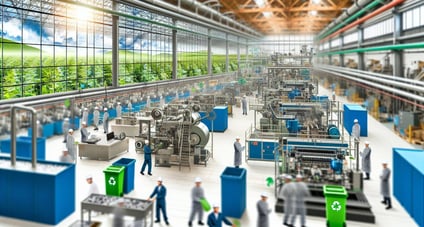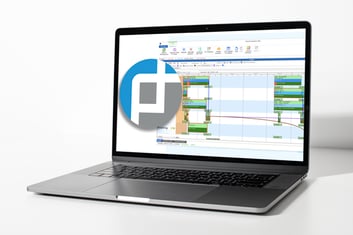Sustainable Manufacturing Practices for Reducing Environmental Impact
In recent years, the imperative for sustainable manufacturing practices has grown significantly. Industries, including food and beverage manufacturing, are increasingly recognizing the need to minimize their environmental footprint while maintaining operational efficiency and profitability. This paradigm shift towards sustainability is not only driven by regulatory requirements but also by consumer demand for ethically produced goods.
In this blog, we look into the realm of sustainable manufacturing practices within the food and beverage industry, with a specific focus on how Manufacturing IT can leverage integration between planning software like PlanetTogether and various ERP, SCM, and MES systems, such as SAP, Oracle, Microsoft, Kinaxis, and Aveva, to drive environmental stewardship.

Sustainable Manufacturing in Food and Beverage Industry
The food and beverage industry faces unique challenges in achieving sustainability due to its reliance on agricultural resources, water usage, energy consumption, and waste generation. However, embracing sustainable practices presents significant opportunities for reducing environmental impact while enhancing operational efficiency and brand reputation.
Key Areas of Focus for Sustainable Manufacturing:
Resource Efficiency
Energy Management: Implementing energy-efficient technologies and practices, such as LED lighting, smart HVAC systems, and energy monitoring software, can reduce electricity consumption significantly.
Water Conservation: Water is a precious resource in food and beverage production. Technologies like water recycling systems and drip irrigation can minimize water usage, while real-time monitoring systems help identify and rectify leaks promptly.
Raw Material Optimization: Utilizing sustainable sourcing practices and reducing food waste through efficient inventory management and production planning can lower environmental impact and improve resource utilization.
Waste Reduction and Recycling
Waste Minimization: Implementing lean manufacturing principles and optimizing production processes can minimize waste generation. Additionally, deploying advanced waste management systems and collaborating with suppliers for packaging reduction contribute to waste reduction efforts.
Recycling Initiatives: Establishing recycling programs for packaging materials, food waste, and by-products can divert significant amounts of waste from landfills. Integration with MES systems allows for real-time tracking of recycling metrics and performance.
Green Supply Chain Management
Supplier Collaboration: Engaging with suppliers who prioritize sustainability and ethical practices helps create a more sustainable supply chain. Leveraging SCM systems facilitates transparent communication and collaboration with suppliers to ensure compliance with environmental standards.
Transportation Optimization: Optimizing transportation routes and modes of transport reduces greenhouse gas emissions and transportation costs. Integration between planning software like PlanetTogether and SCM systems enables dynamic route optimization and real-time visibility into transportation logistics.

Integration Between PlanetTogether and ERP, SCM, and MES Systems
Effective integration between planning software like PlanetTogether and ERP, SCM, and MES systems is crucial for streamlining operations and maximizing the impact of sustainable manufacturing practices. Here's how integration can facilitate environmental stewardship:
Real-time Data Exchange
Integration enables seamless data exchange between planning, execution, and monitoring systems, providing Manufacturing IT with comprehensive insights into production processes, resource utilization, and environmental performance metrics.
With real-time data availability, decision-makers can identify inefficiencies, anticipate resource shortages, and optimize production schedules to minimize environmental impact while meeting customer demands.
Enhanced Visibility and Traceability
Integration provides end-to-end visibility and traceability across the supply chain, from raw material sourcing to final product delivery. This visibility allows Manufacturing IT to identify areas of improvement, track sustainability KPIs, and ensure compliance with environmental regulations.
Predictive Analytics and Optimization
By integrating planning software with ERP, SCM, and MES systems, Manufacturing IT can leverage advanced analytics and predictive modeling capabilities to optimize production processes, reduce waste, and minimize environmental footprint.
Predictive analytics enable proactive decision-making, such as adjusting production schedules based on anticipated resource availability or demand fluctuations, thereby enhancing operational efficiency and sustainability.
Sustainable manufacturing practices are imperative for reducing environmental impact and ensuring long-term viability in the food and beverage industry. Manufacturing IT plays a pivotal role in driving sustainability initiatives by leveraging integration between planning software like PlanetTogether and ERP, SCM, and MES systems.
By optimizing resource utilization, minimizing waste generation, and enhancing supply chain transparency, manufacturers can achieve significant environmental benefits while maintaining operational efficiency and competitiveness in the market. Embracing sustainability is not just a moral obligation but also a strategic imperative for the future of food and beverage manufacturing.
Are you ready to take your manufacturing operations to the next level? Contact us today to learn more about how PlanetTogether can help you achieve your goals and drive success in your industry.






















LEAVE A COMMENT